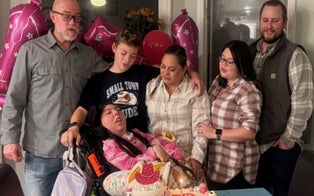Following the killing of George Floyd, America erupted in protest. We wanted to go deeper than the daily news cycle allows.
Originally Published on July 17, 2020.
The video of the death of George Floyd at the hands of Minneapolis police has been inescapable. Its public availability has led to murder charges, it's inspired a mass protest movement, it's effected change in city budgets and in the rules for police engagement in places far from Minneapolis.
George Floyd's killing is only the most recent death that happened to be caught on video. The most recent death to be broadcast widely. Before George Floyd in Minneapolis, there was Eric Garner on Staten Island in 2014. And Tamir Rice, 12, shot and killed by a Cleveland police officer that same year while playing in a park. Philando Castile shot during a traffic stop in 2016 while explaining that he had a registered firearm in the car. That was in Minnesota, too.
And there are the deaths not caught on camera, like Breonna Taylor, shot in her apartment by police executing a no-knock search warrant just two months before Floyd's death. There are the shootings that don't end in death, like Charles Kinsey, a Black therapist who was shot while bringing his autistic patient back to a group home. Then there are the killings that don't involve police officers, like those of Ahmaud Arbery (2020) and Trayvon Martin (2012).
There's Rodney King in 1991, the first beating by police caught by an amateur on videotape and broadcast to the world. There's always more. You go back far enough and the videos disappear, but the violence doesn't. You go back further, and it's photos of public lynchings. A little further still and you'll find the enforced, legal violence of American slavery.
To say that America is finally having the necessary conversation around its history of racist violence degrades all the attempts, largely by Black Americans, at having this conversation prior to 2020. It also has some built-in optimism that doesn't feel earned as of yet. But America is talking. And so are we.
Inside Edition Digital is looking at this moment, at how we got here and what happens next. In a series of in-depth pieces we’re calling The Issue, we're looking at the recent history of police violence against Black people in America and at the protest movement that has emerged since George Floyd's killing. We think that these stories are important. We think hearing from Gwen Carr, Eric Garner's mother, is important. We think listening to protesters who are reclaiming public spaces as safe for everyone is important. We think listening to Black voices recount their experiences with police violence is important.
It’s unclear what happens next, but we believe these stories help to capture this moment of heartache and loss, but also of possibility.
The Editors






